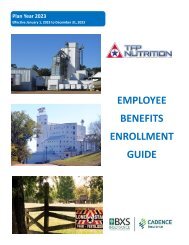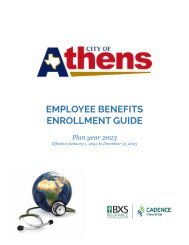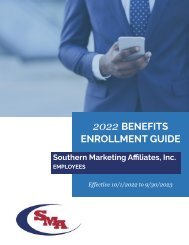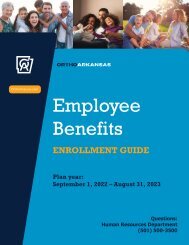Providence Engineering - 2023 Benefits Guide
You also want an ePaper? Increase the reach of your titles
YUMPU automatically turns print PDFs into web optimized ePapers that Google loves.
COMPLIANCE DISCLOSURES<br />
HIPAA PRIVACY NOTICE<br />
THIS NOTICE DESCRIBES HOW MEDICAL INFORMATION ABOUT YOU MAY BE USED AND DISCLOSED AND HOW YOU MAY OBTAIN ACCESS TO THIS INFORMATION.<br />
PLEASE REVIEW IT CAREFULLY.<br />
Name of Health Plan: <strong>Providence</strong> <strong>Engineering</strong><br />
Why is the Plan providing me with this Privacy Notice?<br />
This Notice is being provided to you in accordance with the requirements of the Standards for Privacy of Individually Identifiable Health Information of the Health<br />
Insurance Portability and Accountability Act (the “HIPAA Privacy Rules”). The HIPAA Privacy rules are federal laws that seek to ensure the privacy and confidentiality of<br />
your health information. The HIPAA Privacy Rules require the Plan to take certain actions to protect the privacy of your health information. This Notice has been<br />
prepared to advise you of the uses and disclosures of your Protected Health Information (as defined below) that may be made by the Plan and to advise you of your<br />
rights and the Plan’s legal duties relating to the privacy of your Protected Health Information.<br />
What is Protected Health Information?<br />
Protected Health Information generally is individually identifiable health information, including demographic information, collected from you or created or received by a<br />
health care provider, health care clearinghouse, a health plan or your employer on behalf of a group health plan that relates to:<br />
(1) your past, present or future physical or mental health or condition;<br />
(2) the provision of health care to you; or<br />
(3) the past, present or future payment for the provision of health care to you.<br />
For example, the information included in an explanation of benefits (“EOB”) from the Plan is Protected Health Information. In addition, Protected Health Information<br />
includes genetic information which includes information about your genetic tests or the genetic tests of your family members or the manifestation of a disease in one of<br />
your family members. For example, the fact that your spouse is diagnosed with Type II diabetes is genetic information.<br />
Will the Plan have access to my Protected Health Information?<br />
Yes. As an individual enrolled in the Plan, you should be aware that the Plan may have access to your Protected Health Information from time to time. The Plan may<br />
receive your Protected Health Information in a variety of ways. An example of how the Plan may receive this information is when your healthcare provider, such as your<br />
doctor or your hospital, submits bills for services rendered to you to be paid by the Plan.<br />
When may the Plan use or disclose my Protected Health Information?<br />
The law permits the Plan to use or disclose Protected Health Information to carry out “treatment,” “payment” and other “health care operations”. When the Plan<br />
makes uses or disclosures of your Protected Health Information for treatment, payment or health care operations purposes, the Plan is not required to notify you or<br />
obtain your Authorization (discussed further below).<br />
Treatment: Treatment means the provision, coordination, or management of healthcare and related services by health care providers, including the coordination or<br />
management of health care by a health care provider with a third party (such as an insurer of the Plan), consultation between providers with respect to a patient, and<br />
the referral of a patient for health care from one provider to another. The Plan itself does not engage directly in “treatment” under the HIPAA Privacy Rules. However,<br />
the Plan may interact with a health care provider in treatment transactions.<br />
Payment: Payment means activities undertaken by the Plan to determine eligibility for benefits or fulfill its responsibility for coverage and provision of benefits under<br />
the Plan. Examples of when the Plan might use or disclose Protected Health Information for payment purposes include disclosures to facilitate the payment of claims<br />
made on the Plan by health care providers, the Plan’s activities to obtain or provide reimbursement for the provision of health care, or the Plan’s activities in obtaining<br />
premiums. When the Plan discloses information for payment purposes, the Plan will attempt only to disclose that Protected Health Information which is minimally<br />
necessary to ensure proper and timely payment of claims.<br />
Health Care Operations: The term “health care operations” means those other functions and activities that the Plan performs in connection with providing health care<br />
benefits. Examples of what constitute health care operations during which the Plan might use or disclose your Protected Health Information include activities relating to<br />
creation, renewal or replacement of a contract of health insurance or health benefits, business planning and development relating to the Plan, and compliance with the<br />
HIPAA Privacy Rules. Another example would include the Plan’s use or disclosure of Protected Health Information to better manage its operations, such as when the<br />
Plan discloses information with a vendor or consultant (commonly referred to as a “Business Associate”) to ensure proper accounting and record-keeping relating to the<br />
Plan’s provision of health care benefits. Under contractual agreements with the Plan, Business Associates can receive, create, maintain, use, and disclose your Protected<br />
Health Information, without your consent, but only to assist the Plan with its payment, operations, and other limited purposes.<br />
May the Plan use or disclose my Protected Health Information for other purposes?<br />
Yes. For uses or disclosures of Protected Health Information that are not made for treatment, payment, or health care operations purposes and for which no exception<br />
regarding Authorization applies, the law requires the Plan to obtain your Authorization. An Authorization is your approval for the Plan’s disclosure of your Protected<br />
Health Information to a particular person or entity for a particular purpose. For example, in general and subject to specific conditions, the Plan will not use or disclose<br />
your psychiatric notes. You may revoke an Authorization at any time, but a revocation is not effective if the Plan has already reasonably relied on your Authorization to<br />
make a particular use or disclosure. Examples of when an Authorization would be required include when the uses or disclosures are made to your employer for<br />
disability, fitness for duty or drug testing purposes. Additionally, if you request that the Plan use or disclose your Protected Health Information, the Plan may require<br />
that you sign an Authorization that permits the Plan to honor your request.<br />
When might the Plan make a use or disclosure of my Protected Health Information without my Authorization?<br />
As discussed above, the Plan is not required to obtain your Authorization to use or disclose your Protected Health Information for treatment, payment or health care<br />
operations purposes. Additionally, there are some limited exceptions in which the law allows the Plan to use or disclose your Protected Health Information for purposes<br />
other than treatment, payment, or health care operations without your Authorization. Most of these uses or disclosures are<br />
35
















